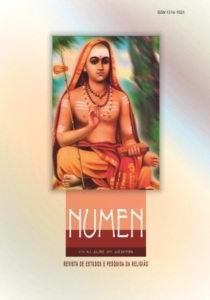Estudo da Influência Indiana na Moderna Filosofia Chinesa, Centrado na Análise das Traduções Chinesas do AbhidharmaKosa / Study of Indian Influence in Modern Chinese Philosophy, Centered on the Analysis of the Chinese Translations of Abhidharma Kosa
Abstract
Resumo
O estudo do pensamento da modernidade chinesa tem sido abordado de um modo geral em duas principais vertentes; na introdução da filosofia ocidental e na formação do Confucionismo moderno. Os estudos da filosofia ocidental na China moderna tratam geralmente do processo que se estende do fim do século XIX até a forte influência exercida pelo pragmatismo e pelo marxismo, durante as décadas de 20 e 30 do século XX. De um modo geral, esse processo tem sido pensado em sua relação com a consolidação da modernidade chinesa. Em contraste com isso, o surgimento do Confucionismo moderno é compreendido de forma frequente como uma reação autóctone em relação à modernidade; assim sendo, esses estudos dificilmente escapam de uma oposição binária em relação à afirmação e à negação da modernidade. Existe, no entanto, outra vertente de pensamento que influenciou de forma decisiva o desenvolvimento do pensamento da modernidade chinesa e que é raramente estudada em seus próprios termos. Trata-se aqui da influência da filosofia indiana, fortemente presente através do renascimento da escola Yogacara do Budismo na China moderna. Um aspecto importante dessa outra vertente de influência é que ela traz em si a possibilidade de apresentar uma perspectiva divergente em relação à oposição binária entre afirmação e negação da modernidade. Este estudo procura esclarecer o pano de fundo conceitual do pensamento indiano presente na China através de uma análise comparativa das duas traduções chinesas do AbhidharmaKo?a de Vasubandhu; as traduções de Paramartha (499-569) e Xuan Zhang (602-664). Essa análise será centrada nos conceitos de “dharma” e “dharmapravicaia” (discriminação analítica dos dharmas). Será dada uma ênfase especial às diferenças existentes entre esses conceitos e a concepção das “dez mil coisas” (Wànyou) no pensamento chinês tradicional.
Palavras-chave: Filosofia indiana; Pensamento chinês; AbhidharmaKosa Paramartha; Xuan Zhang; Dharma; Dharmapravicaya.
Abstract
In a general sense, studies on modern Chinese thought have been centered in two main currents. That is to say, in the introduction of western philosophy and in the formative process of modern Confucianism. Studies on the introduction of western philosophy treat generally the process that starts in the end of XIX century and culminates with the strong influence of pragmatism and Marxism on the twenties and the thirties of the XX century. Generally, this process usually is related to the consolidation of Chinese modernity. In a sharp contrast to this, modern Confucianism is frequently understood as an autochthone reaction against modernity. Those studies present a clear difficulty: they are based on a binary opposition between the affirmation and the denial of modernity. However, there is another current that is extremely influential in the development of modern Chinese thought and that is rarely studied in its own terms. Wevare making reference here to Indian philosophy, which is strongly present in the renaissance of the Yogacara school of Buddhism that takes place in modern China. One important aspect of this current is that it brings within itself the possibility of overcoming the binary opposition between the affirmation and the denial of modernity. This study tries to clarify the conceptual background of Indian thought present in China through a comparative analysis of the two Chinese translations of Vasubandhu´s AbhidharmaKosa. That is to say, of the translations of Paramartha (499-569) and Xuan Zhang (602-664). This analysis will be centered in the concepts of “dharma” and “dharmapravicaia” (analytical discrimination of the dharmas). It will be given a special emphasis on the difference between those concepts and the conception of “ten thousand things” (Wànyou) in traditional Chinese thought.
Keywords: Indian philosophy; Chinese thought; AbhidharmaKosa; Paramartha; Xuan Zhang; Dharma Dharmapravicaya.
Downloads
Downloads
Published
How to Cite
Issue
Section
License
- O envio de artigo implica automaticamente a cessão dos direitos autorais à Numen, que não se obriga a devolver os originais das colaborações examinadas e revisadas. Numen reserva-se todos os direitos autorais dos artigos publicados, inclusive artigos traduzidos, contudo, mediante solicitação, pode autorizar sua posterior reprodução desde que citada a fonte. Pela cessão do direito autoral, os autores e as autoras recebem dois exemplares; autores e autoras de resenhas recebem um exemplar do respectivo número.
- Artigos que não seguirem as normas formais de apresentação aqui especificadas serão devolvidos para posterior adequação pelos seus autores.
- Os artigos publicados na Numen são de total responsabilidade dos respectivos autores e autoras.
- O envio de artigo implica automaticamente a cessão dos direitos autorais à Numen, que não se obriga a devolver os originais das colaborações examinadas e revisadas. Numen reserva-se todos os direitos autorais dos artigos publicados, inclusive artigos traduzidos, contudo, mediante solicitação, pode autorizar sua posterior reprodução desde que citada a fonte. Pela cessão do direito autoral, os autores e as autoras recebem dois exemplares; autores e autoras de resenhas recebem um exemplar do respectivo número.
- Artigos não enquadrados nas normas de apresentação especificadas serão devolvidos para posterior adequação pelos seus autores e autoras.
- Os artigos publicados na Numen, no que diz respeito ao conteúdo, correção lingüística e estilo, são de total responsabilidade dos respectivos autores e autoras.







